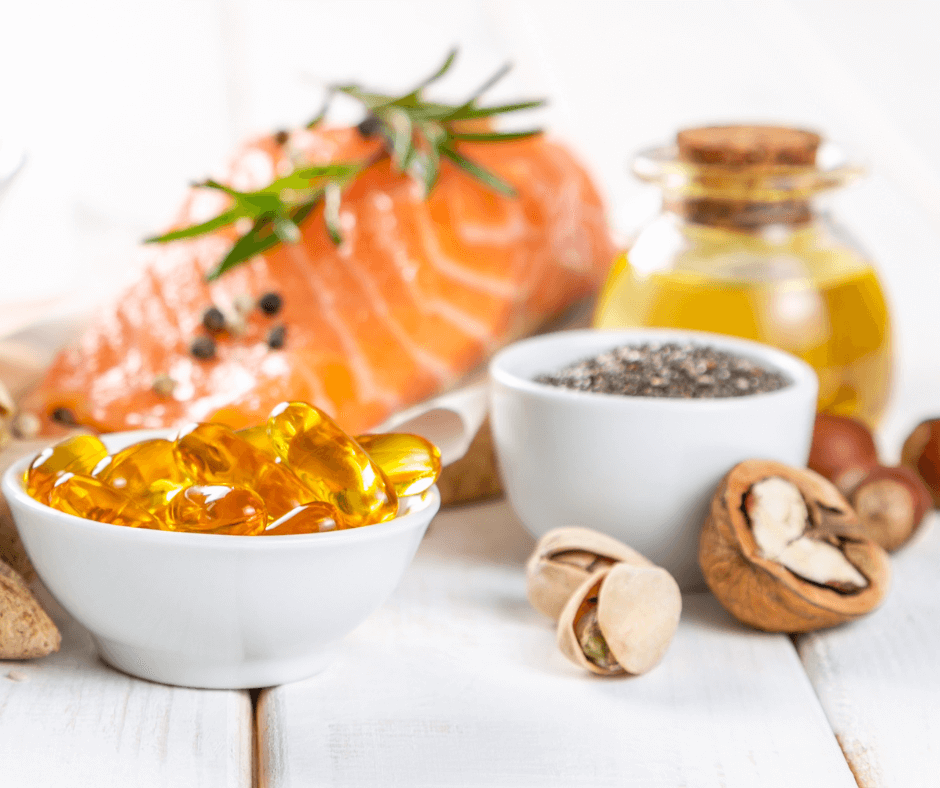Omega 3 Rich Foods: Best sources of Omega 3

What is Omega-3?
Omega 3 is a healthy form of fat. More specifically, it is classed as a type of polyunsaturated fatty acid and is an essential component of our diet. Omega 3 cannot be made by our bodies and must be sourced from foods rich in omega 3.
Overview of omega-3 fatty acids
Omega 3 fatty acids are split into 3 main types: alpha-linolenic acid (ALA), docosahexaenoic acid (DHA) and eicosapentaenoic acid (EPA). Foods with omega 3 vary in the amounts of ALA, DHA and EPA. Plant based omega 3 is higher in ALA, which is a less efficient source compared to seafood-based omega 3 that is richer in EPA and DHA. There is one vegan Omega 3 food that is the exception to the rule and that is marine algae. Marine algae, like fish, is high in DHA and EPA.
Physical and mental health benefits of Omega 3
The physical and mental health benefits of Omega 3 are vast. Omega 3 rich foods provide two specific fatty acids named EPA and DHA that provide health benefits for the brain, eyes and heart.
Physical health benefits of omega 3 include:
- Heart health – the components of Omega 3 DHA and EPA contribute to the normal function of heart. Studies have shown that diets like the Mediterranean diet that are made up of fresh fruits, vegetables and fish are cardioprotective.
- Eye health – Omega 3 DHA contributes to the maintenance of normal vision in adults and children. Omega 3 fatty acids foods that contain DHA are important to get this health benefit.
- Skin and hair health – omega 3 has shown benefits for skin and hair health. Omega 3s have shown in studies that they may have benefit in reducing inflammation hence their benefit in conditions like acne and eczema (1). A study showed that nutritional supplementation of omega 3 in women for hair loss reduced hair loss and improved hair density (2).
- Pregnancy, breastfeeding and infants – Omega 3 DHA contributes to normal brain and eye development of the foetus, breastfed child and in infants.
Mental health benefits of omega 3 include:
- Brain health – Omega 3 rich foods that are predominantly made up of DHA are shown to be important in the maintenance of normal brain function in adults and children.
- Shown to help depression – Your brain requires the recommended daily intake of Omega 3 DHA and EPA to function normally. Omega 3 fatty acids DHA and EPA have shown to play a role in certain types of depression. There has been a recommendation to healthcare professional that they should recommend an omega 3 supplement to their patients alongside a medical care plan. It is advised to check with healthcare professional what is best for you. Even though more studies are needed to be performed to support this further, the thinking is that omega 3 supplements are generally cheap and have a good safety profile (3).
- Shown to help attention deficit hyperactivity disorder (ADHD) symptoms – There has been a review of around 25 studies that has shown that omega 3 DHA and EPA showed improved outcomes in ADHD (4).
- Has shown benefit in autism – Deficiency in omega 3 fatty acids may be linked to autism spectrum disorder (5)
- May help improve concentration – Study suggests that higher omega 3 concentrations are associated with better brain structure (omega 3s DHA and EPA are components in cell structure) and better cognitive function (6).
Omega 3 foods: Vegan and vegetarian sources
Omega 3 rich foods that provide a vegan and vegetarian source range from seed oils to algal oil.
Vegan omega-3 sources can be a great choice if you are looking for an alternative to fish or fish oils. Vegan omega 3 provides a more ethical and sustainable omega 3 option and an alternative to those with a fish or shellfish allergy.
The best foods with omega 3 that are vegan, and vegetarian include:
- Algal oil – Algal oil, also known as marine algae, is widely considered the best source of vegan omega 3. This is because it directly provides EPA and DHA which have more direct health benefits compared to ALA. All other plant-based options, including those listed below, only provide ALA. ALA must be broken down by the body into the useful omega 3 forms EPA and DHA, this process is inefficient.
- Flaxseed oil – Flaxseed is a whole food rich in omega 3. It is rich in ALA and is one of the best vegan and vegetarian source, hence it is commonly used as an omega 3 supplement. Flaxseed also provides other nutrients like magnesium.
- Nuts like walnuts – Walnuts are packed with nutrients like omega 3 and other nutrients like vitamin E.
- Chia seeds – Chia seeds are highly nutritious and were even used by the Aztecs as a food source and for retaining water in the body on long journeys. Chia is high in omega 3 and other nutrients like selenium.
- Hemp seed – hemp seeds provide a good source of the omega 3 ALA and can be easily sprinkled on yogurt, breakfast bowls or mixed in smoothies.
Best sources of Omega 3 in Seafood
The best sources of Omega 3 in seafood come in the form of many types of fish and shellfish. Seafood and shellfish provide high levels of the efficient omega 3 fatty acids: DHA and EPA. This gives the advantage over plant-based options that only provide ALA which then must be broken down into DHA and EPA. The exception being algal oil which provides a comparable omega 3 source to fish.
The best Seafood omega 3 rich foods include:
- Mackerel – Mackerel are the most nutrient dense form of omega 3. Mackerel is high in DHA and EPA content which is important for normal brain and eye function.
- Salmon – Salmon are a close second to mackerel in terms of the amount of omega 3 per gram. Salmon is a nutrient dense food and a great source of EPA and DHA.
- Cod liver oil – Cod liver oil is high in DHA and EPA plus other vitamins. Cod liver oil should be avoided in pregnancy due to its high vitamin A content which is harmful to the growing foetus.
- Oysters – shellfish like oysters can be a good source of omega 3. However, they are usually eaten as a delicacy rather than regularly as a part of a balanced diet. Interestingly oysters contain the most zinc of any other food.
- Herring – Herring is an oily fish, high in omega 3 DHA and EPA. The department of health recommend at least one portion of oily fish weekly within a balanced diet.
All in all, there are plenty of foods with omega 3. This includes vegan omega 3 foods like walnuts and fish-based omega 3 like salmon. If it is difficult to get omega 3 fatty acids through diet alone then omega 3 supplementation can be a good option. Algal oil, a vegan omega 3 source, that is high in DHA and EPA is a great option for all. Algal oil is more ethical and sustainable when compared to fish or fish oil. Algal oil provides DHA and EPA omega 3 fatty acids directly; this gives it an advantage over other plant-based options that only provide ALA.
References:
- https://pubmed.ncbi.nlm.nih.gov/24505395/
- https://pubmed.ncbi.nlm.nih.gov/25573272/
- https://www.ncbi.nlm.nih.gov/pmc/articles/PMC533861/
- https://www.ncbi.nlm.nih.gov/pmc/articles/PMC4968854/
- https://www.ncbi.nlm.nih.gov/pmc/articles/PMC5634395/
- https://n.neurology.org/content/99/23/e2572




Comments
Lascia un commento
Your Email Address Will Not Be Published. Required Fields Are Marked *